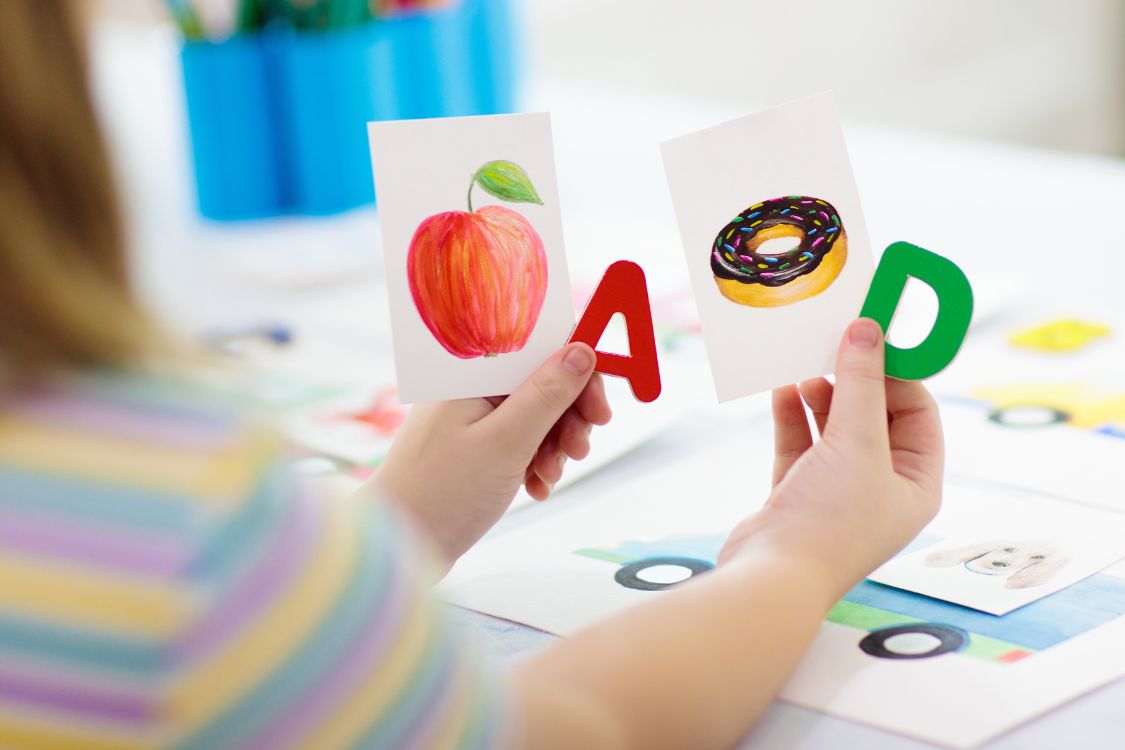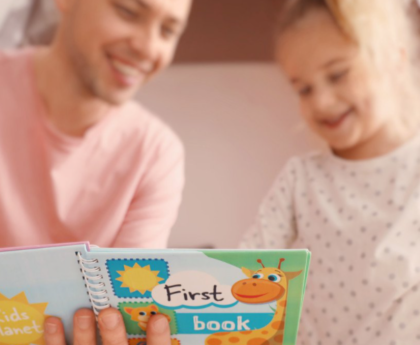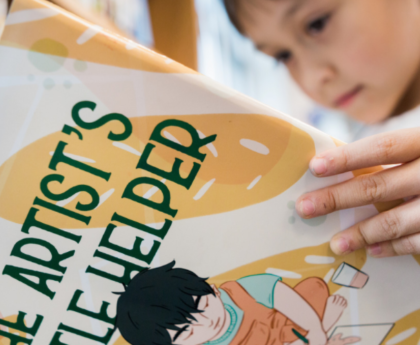Early literacy is an important foundation in child development. It sets the stage for communication, school readiness, lifelong learning, and future success. When children have early literacy experiences, the brain is activated in areas related to language, expression, attention, memory, emotional regulation, and more.
Should children be able to read before kindergarten? It depends on the child. Usually, children develop pre-reading skills throughout preschool and begin early reading in kindergarten.
As a parent or educator, you play a major role in your child’s literacy and reading development– no matter what stage they are in. Here are some ways you can support your child’s journey as they learn to read.
Foundations of Pre-Reading
Children enter the pre-reading stage when they become aware of the concept of reading but have yet to develop decoding (word-reading) skills.
For example, toddlers and preschoolers pretend to read books during playtime. Up until kindergarten, children may ask adults to read their favorite books to them over and over. Pre-readers often make up stories while looking at picture books and modeling what they see from teachers or parents.
Several foundational skills equip children to ride their “training wheels” of reading and storytelling:
- Phonemic awareness: the understanding that words are made up of individual speech sounds and can be used to communicate.
- Vocabulary development: the collection of words a child acquires, knows, and uses.
- Print awareness: the understanding that print holds meaning and that books contain stories in print.
As these foundational skills develop, children begin to reach new literacy milestones that lead to reading readiness.
A Guide to Literacy and Reading Milestones Before Kindergarten
While every child learns to read at their own pace, several reading milestones signify development before kindergarten.
Knowing these stages can help parents and educators form realistic expectations when helping children learn to read. Below are some practical ways you can help your child through these reading milestones by age!
Infancy to Toddlerhood
From infancy to toddlerhood (ages 0-3), children begin to foster pre-reading skills.
They pick up the sounds of language spoken by people around them (phonemic awareness) and learn to associate those sounds with meaning. This leads to the development of vocabulary as a child learns what certain words mean. They begin to connect words with items and people in their surroundings.
Ways to encourage pre-reading skills in toddlers:
- Read aloud to your child
- Sing interactive songs and nursery rhymes together
- Engage with your child during storytime, allowing them to point at pictures and respond to the pages
- Be intentional about reading books your child enjoys
- Praise your child when they learn new vocabulary words
- Frequent literacy-rich environments such as libraries and bookstores
- Build a kids’ library in your home
The earliest stages of literacy happen gradually without explicit instruction. Typically, children naturally pick up language and speech in their homes and communities.
Preschool Years
During the preschool years (ages 3-5), children learn to build upon their language awareness. They can complete more challenging activities such as matching, rhyming, word games, and observing environmental print. They begin to recognize letters and numbers. They might be introduced to early phonics instruction at daycare or preschool.
Ways to support preschoolers’ reading development:
- Play with letter puzzles
- Play matching games (ex. matching the same letters together or matching uppercase and lowercase letters)
- Holding a writing utensil
- Introduce letter-tracing activities
- Read rhyming books with your child
- Play with magnetic letters on the fridge
- Play word games such as “I Spy” and “What is this letter?”
- Practice sequencing while reading together
As preschoolers build pre-reading skills, they become ready for more explicit instruction that’s required for reading.
Preparing for Kindergarten
When transitioning into kindergarten, children have varying literacy abilities. Some may know the alphabet and early phonics whereas others may not know all the letters yet.
Regardless, this developmental milestone involves being aware of the alphabet, understanding concepts of print, making sense of storylines, and identifying basic letters or sight words (such as their name, “I,” or “the”).
Ways to prepare your child for reading in kindergarten:
- Read with your child daily
- Welcome “pretend reading” and storytelling
- Model good reading behavior and fluency
- Re-read their favorite books, asking them what comes next
- Begin teaching the alphabet
- Introduce letter sounds at the child’s pace
- Engage your child in activities involving text and environmental print
By the end of kindergarten, early readers tend to identify beginner, middle, and ending sounds. They may recognize and create rhymes, write their name, read familiar words, practice blending, and read emergent-reader picture books.
Fostering Your Child’s Love for Reading
Aside from actual language and reading skills, there are a few social/emotional strategies to empower your new reader. Instilling a love of reading is one of the most helpful things you can do! It all begins with the right attitude and environment.
Set an Example
Be a role model to your child by modeling a love of reading and stories. If you aren’t a big reader, identify a positive role model in your family or friend group who loves to read. When reading with your child, you can set a positive example by expressing accurate emotions, reading fluently, and treating storytime as a fun experience instead of a chore.
Develop a Reading Ritual
Regular reading experiences are important for pre-readers and kindergarteners. As their brains develop crucial literacy skills for reading, repetition is vital to continued growth. Plus, reading sessions with your child provide closeness and emotional bonding, which is another important part of your child’s development.
Identify Meaningful Real-Life Connections
Connect books and stories to things in real life. If your family has pets, read age-appropriate books involving the same type of animals. You can find children’s books that highlight your family’s cultural background, unique dynamic, and location, allowing your child to feel connected to meaningful works of print. Ask your child questions about what they think and how they feel after reading books that relate to their personal experiences.
Improve Word-Reading Skills
Competence in word-reading skills creates confident readers. Children who can read words (decode) more easily will enjoy reading more. Show your child that they can blend sounds to read words. If you aren’t sure where to start, the Reading.com app walks parents and children through the process of learning to read words, step-by-step.
Pre-K and Kindergarten Reading Activities from Reading.com
To further support your child on their reading journey, the Reading.com app offers fun, evidence-based reading activities. The exercises are meant to include parent engagement, facilitating an educational bonding activity for you and your early reader.
From letter games and phonics lessons to interactive storybooks and videos, Reading.com has everything you need to help your child practice their skills at home. Download the Reading.com app today to start a 7-day free trial!





